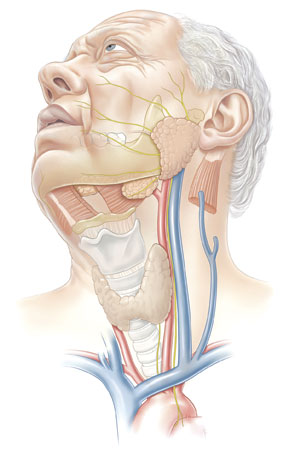 |
|||||||||||||||
|
|
 |
 |
|||||||||
Parotid GlandThe parotid gland is a paired salivary gland, which occurs immediately in front of the ear down to the upper neck behind the jawbone. It normally cannot be felt by touching. The normal function of the parotid gland is to produce saliva, which ultimately drains into the mouth by way of a small tube or duct. Each gland may produce about 20% of the total saliva produced. Parotidectomy This is the term given to an operation involving the removal of the parotid gland. The requirement for removal of part of the gland (superficial parotidectomy) or all of the gland (total parotidectomy) is usually due to tumour (benign or malignant), or recurrent infection. The majority by far of parotid tumors are benign, and often this can be determined before any operation by doing a needle sample (FNA). A CT scan may also be recommended before an operation is performed. The operation requires a general anaesthetic, typically takes 1 - 2 hours and requires 1- 2 nights stay in hospital convalescing. A small tubular drain is typically inserted into the wound and removed the day following surgery. Possible Complications and Risks The major potential risk of any operation on the parotid gland is damage to the facial nerve. The facial nerve passes from behind the ear forwards to the muscles involved in moving the face, coursing through the parotid gland as it does so. Any operation on the parotid gland therefore places the facial nerve at risk. The art of the procedure therefore involves removal of the parotid gland, while maintaining function of the nerve. Damage or trauma to the nerve during the course of an operation on the parotid gland may result in temporary or permanent weakness of that half of the face operated on. The risk of this happening ranges from less than one in five hundred for small benign tumours, but may be higher in patients with very large tumours, or patients with malignant tumours which may require a wider removal of tissue, or which may have tumour growing into the nerve. In some situations the tumour itself may have already weakened the face. The surgeon will inform you of the approximate risk in your individual case of this happening. Other perhaps more common complications, but generally of less concern to the patient are cosmetic changes (the incision is that used in a face lift operation, and once healed is normally imperceptible), the rare chance of bleeding into the wound postoperatively, saliva leakage from the wound postoperatively, and occasionally sweating from around the wound after a meal. Many patients will however notice numbness in the lobe of the ear after the operation, which usually remains noticeable for 2 to 3 months. This is due to intentional division of the sensory nerve into the lower ear, as it passes over the parotid gland. Instructions for Surgery for Parotidectomy
You may also refer to the Preparing for Surgery patient information sheet. FASTING: (food & liquid) from midnight for a morning operation and from 7.30am for an afternoon operation, a light breakfast of tea and toast is OK prior to 7.30am.? Children under 14 may have clear fluids only up until 10.30am, (NO MILK) but definitely nothing after 10.30am. FORMS: Hospital admission forms and anaesthetic forms should be completed and returned to the hospital at least 3 days prior to the date of your operation.? If you have any queries regarding your operation please do not hesitate to contact Dr Nicholson’s rooms. Post operative care for Surgery Dr Nicholson will provide you with specific instructions for post operative care. *These notes are an outline only and should be expanded on in discussion with Dr Nicholson.
|
The patient information sheets are intended as a guide only and not to take the place of a full discussion of this procedure with Dr Nicholson
|
|||||||||
|
||||||||||
|
